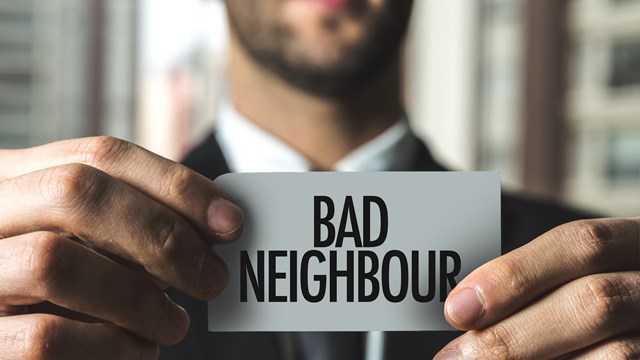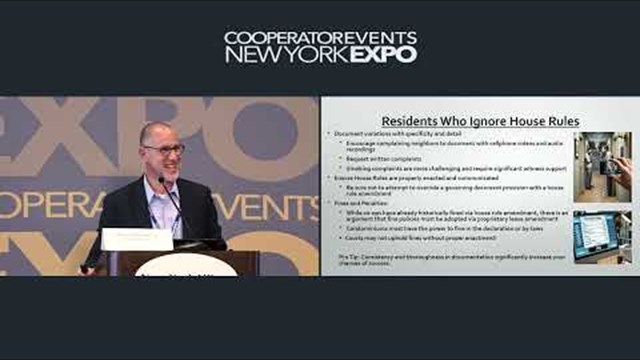In the course of human events, it's almost inevitable that somewhere, at some point, tempers will flare and someone will say something awful about someone else. It can happen after the PTA meeting, in the gym, at the office...even in one's own co-op or condo building. Heated exchanges and personal vendettas are unpleasant and can make for an acrimonious building environment, which is bad enough—but what happens when the words do more than just sting or insult? What happens when it's more than just an offhandedly rude remark, or when it's ongoing?
Allowed...Or Illegal?
The good news for boards and owners in co-ops and condos is that most of what is said and printed regarding life within the community—even when heated and contentious, and even if not entirely true—is broadly protected by law.
When it comes to board members and building residents, “They are a ‘qualified group,’” explains attorney Jim Samson, a partner in the law firm of Samson Fink & Dubow, LLP, in Manhattan. As such, they are protected by the so-called common interest privilege, which was contrived, Samson says, “to encourage open and free and frank discussion among members of a restricted group, like a group of shareholders or board members. Communication among them for the purpose of furthering the corporate business has a defense against libel and slander, even if it turns out to be untrue—as long as you’re not being malicious about it.”
It is maliciousness, when it becomes defamation, that is the stuff of which lawsuits are made. And sometimes the line between the open discourse protected by law and actionable defamation is thin. To stay on the right side of that line—i.e., out of court—it behooves board members to study the basics of the laws regarding defamation.
According to the pros, defamation occurs when you publicly malign someone’s character by accusing him or her of doing something that is reprehensible or criminal, and thereby damage their reputation. Written defamation is called libel, and defamation that is spoken is called slander. If they can substantiated in court, damages that result from such statements can result in heavy penalties.
The Absolute Defense
Boards and shareholders are protected in many respects from defamation. First and foremost, truth is an absolute defense against charges of defamation. If you can prove without a doubt that the person you accuse of having done something awful actually did it, they cannot then accuse you of defaming them.
“I can write in an article that John Doe is a thief,” says attorney Mark Hankin of Hankin & Mazel, PLLC in Manhattan, “and if I looked it up and found out that he was in fact convicted of robbery, it’s absolutely true and I have the right to say it.”
On the other hand, Hankin adds, “If I did not know that for a fact and I accused him of a crime without having any background,” there might be a case for libel, depending on who saw the accusation. “It doesn’t become defamation until a third party other than the person you are libeling sees it.”
In another example, says Hankin, “If all I did was send a letter to Ms. Smith saying I think the mayor of the city of New York City is a thief, the mayor has very little in damages against me, because the only one who ever saw it was Ms. Smith. On the other hand, he adds, “If I say in The Cooperatorthat the mayor is a thief, I have published it to however many people they have in their subscription circulation. That's a major lawsuit if what I said was untrue.”
It should be noted that harassment—unwanted communication involving threatening behavior—is a category of offense separate from defamation, that can sometimes veer into the criminal. A harassment suit often results in a restraining order against the harasser. Where it gets sticky for a co-op or condo building is when a resident is awarded a restraining order against someone and their building's doorman and staff are then expected to prevent that person's access. The solution for that is simple: if the “guest” shows up, instruct building staff members to call the police and let them decide how to handle him or her.
What Happens in the Co-op,
Stays in the Co-op
Legally, board members have a wide berth regarding what is said and published within their community. “What the courts have said,” explains Hankin, “is that board members are like quasi-public officials and when they make statements about members, there is a quasi-public privilege because they are only making them in the context of their position as board members.”
The board is allowed to make pretty much any statement relevant to the operation of the co-op, says Hankin. “If I say Mrs. Murphy is a psychopath because she yells and screams in her apartment after 11 o’clock at night, which is in violation of the rules and regulations, I’m making that statement as a board member of the cooperative looking to enforce my rules. I have a privilege to make that statement and it cannot be muted when it comes to the co-op.”
How much information a board chooses to publish about individual residents in the minutes of their meetings, which is a public document, is mostly left to their discretion. Should they choose to publish the names of shareholders who are in arrears, for example, as fiduciaries they are within their rights to do so, says Manhattan attorney Helene W. Hartig.
“The community has the right to know what’s affecting the value of their investment,” Hartig explains. “If their neighbor is a deadbeat, they have the right to know that.” But, she adds, if they go on to say, “‘and by the way, they have stiffed every guy in town' without conducting an investigation as to whether that’s true—that crosses the line.”
The limited privilege extends to most of the business of the co-op. Hankin recalls a case of a co-op in Queens where the president of the board sued the co-op after he lost his presidency, claiming that the board—which he had been a part of—didn’t maintain the premises adequately, and which he said resulted in the loss of value of his units. He owned 10.
“One of the causes of action of his complaint was that the board said things about him to other board members and shareholders that were defamatory,” recalls Hankin. “They said that he had hired a managing agent without the board’s approval, which was improper as a board member.”
The judge held that there is a limited privilege in any such statements, says Hankin. Namely, “That the shareholders and board members have to be able to say what they think or feel about other members of the board, so that shareholders know who is representing them. They have to be protected.”
“In my opinion,” Hankin adds, “he should have been sanctioned. But they don’t want to go that far.” The judge dismissed the claim.
Ulterior Motives
Charges of defamation are often brought against boards to discredit their decisions. Hartig recalls the case of a would-be buyer who was rejected by a board, which declined to provide her with a reason for the rejection—well within their right according to the bylaws of the co-op. (In fact, as it turned out she was rejected for problematic finances.)
The purchaser, says Hartig, “knew that the managing agent had sat in on the interview and assumed that one of the people in the interview had badmouthed her.” The rejected purchaser sued the managing agent personally and the building for defamation, she recalls, “hoping this would cow the board into changing their minds. In fact, it only strengthened the board’s resolve not to sell to her. Insurance handled the case and in the end it was dropped.” The buyer’s deposit was returned, but no damages were awarded.
Some buildings are sued a lot, particularly very large ones that people perceive to have deep pockets. According to Hartig, some people figure that “boards don’t like bad publicity. So, for example, a would-be buyer who was rejected might say, ‘Maybe I’ll hit the jackpot if I sue for discrimination [a distant cousin of defamation] and they’ll wind up just paying to shut me up.’ You see all sorts of crazy lawsuits, especially in this recession.”
Within the community in general, says attorney Dennis H. Greenstein, a partner in the Manhattan law firm of Seyfarth Shaw LLP, “The typical stuff is where people send out nasty emails, or they make a statement in the middle the shareholders meeting on the order of ‘You sir, are a thief and a liar.'” But such outbursts are seldom considered defamation. “There’s a certain slack the courts give to allowing things to be said that reasonable, fair and ethical people would view as completely outrageous and a violation of law.”
When particularly egregious accusations are tossed at board members by shareholders, legally defamatory or not, Greenstein recommends handing them over to the building’s attorney for immediate action. “We’ve had people who have accused the treasurer of stealing money, or someone on the board getting kickbacks from contractors. If [an accusation] arises out of a person's being on the board, I feel it is appropriate to have the attorney for the building respond to it.”
When a board member is continually harassed or threatened, or for that matter if a resident aims particularly outrageous or threatening statements at another resident, the board might be able to find that shareholder in default of their lease under the stipulations in the proprietary lease. “It could be a basis for having that person's lease terminated,” explains Greenstein.
Newsletters and Websites
Most statements disseminated to residents of a building, whether by mass emails, in newsletters or on websites, even when not true, fall within the qualified privilege protection and are not actionable, again, unless they show malice.
According to attorney David L. Berkey of the law firm of Gallet Dreyer Berkey in Manhattan, “If the material is false and is designed to injure the board member in connection with his business or his activities for the co-op or the condo, then you getting outside the common interest privilege. In at least some instances courts will enjoin the person from sending out those kind of letters.”
Berkey recalls a case he brought last year to stop a woman who had been reprimanded by the board for violating many of the co-op’s rules from circulating materials which intended to injure the board president's professional reputation. The disgruntled resident issued the materials not only among residents, but to the board president’s prospective employers.
“It happens,” says Berkey. “The person decided to engage in retribution, accusing the board president of all kinds of improprieties, most of them absolutely untrue, just designed to slander him in the eyes of the community and to prevent him from getting any work. The judge read three or four pieces of material that were circulated, and he said, ‘That’s enough. Stop.’” The court issued a preliminary injunction stopping the woman from disseminating any more materials.
For the most part, adds Berkey, “Even when we get called to stop egregious cases like that one, the boards will suck it up and say, ‘This too will pass,’ ” even when the board is on the right side of the law—and they usually are. “They don’t respond, and most of the situations will just dissipate over time.”
Petitioning
Another means by which shareholders might express a grievance with their board is by circulating a petition. The rules guiding how petitions are to be handled are usually spelled out in the building's bylaws, which stipulate how many signatures are necessary to compel the board to hold a special meeting or vote to address a particular issue. It’s usually 25 percent of the outstanding shares in the co-op.
While shareholders or association members can force the board to call a special meeting to hear their grievances or opinions about a policy, they do not get to vote on the action the board should take. According to Berkey, the cooperative or condominium board is entrusted with the business of the corporation, and as such, “The board cannot be forced to take certain actions because the shareholders file a petition.”
Sometimes, in their zeal to get their voice heard on an issue, a resident will print up flyers and stick them under apartment doors, or knock on doors to lobby for someone running for the board. The protocol for this sort of expression is not in the bylaws but are controlled by the house rules created and enforced by the board.
There are cases where people have carried signs of protest in front of their co-op or condo building, and the courts have allowed it under their constitutional right of association and assembly. (Though the jury is still out on torches and pitchforks.) But a diligent board and managing agent can keep passions from boiling over and grievances from turning into lawsuits.
Samson implores boards to “Give residents a safety valve to vent. When you tell them you're going to raise their maintenance 35 percent, you have to stand there and take the heat. You’ve got to trust that your neighbors—the shareholders—are responsible enough and smart enough that they will understand.”
To stay on the right side of the law, Hartig says, “My advice to boards is to be very careful not to put their own personal agendas or feelings above that of the apartment corporation—to act professionally, as a fiduciary, and to be careful what they say and how they say it.” And that includes emails, which are discoverable in court.
Be careful not to veer into fiery rhetoric, she adds, because “one man’s fiery rhetoric is another man’s defamation.”
Steven Cutler is a freelance writer, reporter, and author living in New York City and a frequent contributor to The Cooperator.










11 Comments
Leave a Comment